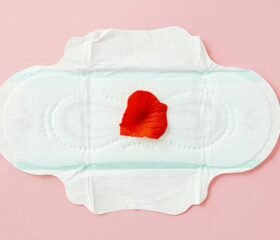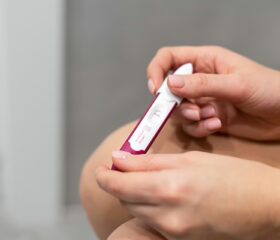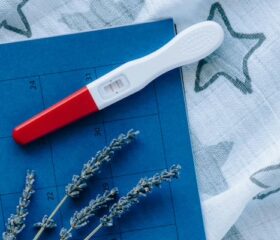Navigating Your First Postpartum Period: What Will It Be Like, and When Will You Get It?
Your first postpartum period marks a significant—although not particularly glamorous—step in your postnatal recovery.

- When will your period return after pregnancy?
- Lochia vs. your first postpartum period: what’s the difference?
- What are postpartum periods like?
- How can you manage your postpartum periods?
- Can your period affect your milk supply?
- When should you call your doctor about your postpartum periods?
- Can you get pregnant before your first postpartum periods return?
- Final thoughts
As your body heals and adjusts after childbirth, you may find yourself wondering when your menstrual cycle will return and what exactly it’ll be like once it does. If you’ve been waiting a while and still haven’t had your time of the month, you may also be afraid that something’s wrong.
To put your mind at ease, let’s look at everything you can expect from your first menstrual period after giving birth.
When will your period return after pregnancy?
Your next menstrual cycle may come as early as 2 to 12 weeks after you give birth. It may also take months to return. It all depends on whether you’re breastfeeding and how often. 1
Exclusive breastfeeding
Your cycle might restart around six months postpartum if you’re breastfeeding exclusively, meaning you’re not pumping or using formula. Exclusive breastfeeding requires having feeding sessions (at minimum) every four hours or so during the day and every six hours at night. 2
This round-the-clock demand increases your body’s production of prolactin, a hormone that suppresses ovulation. Moms who breastfeed frequently develop “lactation amenorrhea”—where your period stops for at least three months in the postpartum period. 3
Your cycle will eventually return when your baby starts sleeping through the night (which results in feeding less often) or when you wean her off breast milk by introducing formula or solid foods. 4
Most breastfeeding moms see their periods return between 9 and 18 months, but others who continue to breastfeed longer than normal may not have a period for up to two years. 5 6
Bottle feeding
Again, you could get your period as early as several weeks after giving birth if you’re supplementing your breast milk with formula or exclusively bottle feeding. 7 Your period is likely to return within 6–12 weeks postpartum. 8
What all of this means is that when you get your first postpartum period is, at least to an extent, under your control. However, every woman’s body is different, and there’s no precise way to predict exactly when it will return.
Lochia vs. your first postpartum period: what’s the difference?
You may have postpartum bleeding—called lochia—for up to six weeks after childbirth. 9 During this period, your uterus will shed its lining of blood, tissue, and mucus from your pregnancy.
Don’t confuse this with your period. Although it sounds similar to your menses, which also involves shedding the uterine lining, it’s a different biological process, and it has nothing to do with ovulation.
Your lochia flow may be heavier than your period (enough to soak through a thick maxi pad in two to three hours). Your flow may be lighter if you had a C-section. 10
Regardless of whether you had a vaginal delivery or C-section, your flow should ease up over the next few days. 11 If it doesn’t, get on the phone with your doctor.
Usually, your uterus will need to finish discharging lochia before you’ll get your period again. 8
When to see your doctor about lochia
Again, lochia usually lasts around six weeks. If you have excessive bleeding or if it lasts for longer (up to 12 weeks after delivery), it may be a condition called postpartum hemorrhage (PPH).
Unlike your menses and lochia, PPH can be a life-threatening condition that needs immediate medical attention. Give your doctor a call if you have: 12
- Heavy vaginal bleeding: As noted, ordinary, healthy lochia may soak through a pad in two to three hours. If your bleeding soaks through a thick pad every hour, you have a problem.
- Low blood pressure symptoms: After losing a lot of blood, you’ll experience symptoms of low blood pressure, like dizziness, faintness, and blurred vision.
- Shock symptoms: In extreme cases, you may go into shock if you have excessive blood loss, resulting in pale or clammy skin, cold feet and hands, a rapid pulse, and difficulty breathing. You may be confused or have an altered mental state. 13
- Large blood clots: Healthy clots from lochia shouldn’t exceed the size of a golf ball or tomato. Very large ones are indicative of PPH.
- Perineal discomfort: You may develop swelling and pain in the perineal area between your vagina and anus.
- Abdominal discomfort: Similarly, if you had a C-section, PPH may cause pain, bruising, or bloating near the area of your C-section scar.
If you recognize any of those symptoms, don’t panic. Just take them seriously and get yourself checked out promptly.
What are postpartum periods like?
Your first period after having your baby may be similar to your pre-pregnancy periods, but it could also be heavier and more painful than usual, with worse cramps.
This can happen because the uterine cavity temporarily grows during pregnancy and needs to shed more lining than before. Your uterus enlarges and shrinks (uterine involution) with each subsequent pregnancy, which can lead to variations in your postpartum periods after every child. 14
This effect can be unpredictable, and some women also report less intense cramping during postpartum. Hopefully, you’ll be one of the lucky ones. 15
Other potential changes
Other changes you might notice in your postpartum periods include:
- Clotting: You may also see small blood clots. These should be smaller than the ones you saw during lochia (i.e., not as big as plums or golf balls). 16
- Irregular cycles: After pregnancy, you may have irregular periods. That’s because it can take time for your hormones to stabilize. You might be late, miss a cycle completely, or even skip several months. 17
Note that if your periods were irregular before your pregnancy, they may continue to be irregular postpartum.
How can you manage your postpartum periods?
Here’s what you need to know about safely managing your menstrual cycle after pregnancy:
Menstrual products
As you know, your flow may be heavier than usual. Despite that, you need to stick to maxi pads while your body heals from childbirth.
Don’t use tampons or menstrual cups for around six weeks. They can irritate your perineal tearing and introduce bacteria to your healing uterus, which puts you at risk of an infection. 18 Wait for your doctor to give you the green light before using these products again.
If and when you return to tampons and menstrual cups, be prepared for them to feel a little different. Your pelvic floor muscles might be weaker after pregnancy, especially if you gave birth naturally, which can loosen your vaginal canal.
Experiment with different sizes and absorbencies to accommodate your body’s changes and heavier flows.
Pain management
Cramping and bloating can also make your first period feel uncomfortable. You can use over-the-counter pain relievers like ibuprofen. Check with your doctor if you’re not sure which medications are safe, especially when you’re breastfeeding.
What to know about nonsteroidal anti-inflammatory drugs (NSAIDs)
If you’re breastfeeding, your doctor may hesitate to prescribe medication like naproxen—also known as Aflaxen, Flanax, Naprelan, and Menstridol—which is a nonsteroidal anti-inflammatory drug (NSAID).
Naproxen stays in the breast milk longer than similar drugs and can pass to your baby in small amounts. This could potentially cause health complications for your baby, like drowsiness or problems in her blood.
There have only been a few reports of babies having side effects from Naproxen in their mother’s breast milk, so it’s unlikely that your baby will have complications. 19 20 Still, follow your doctor’s advice.
If you do take Naproxen while breastfeeding, keep an eye out for signs of illness in your baby and speak with your doctor if you spot any.
Period tracking
Keep track of your menstrual cycle, especially since your body is still recovering. Use a calendar or period tracker app to monitor the length and flow of your period (the best period trackers also let you log your symptoms like cramps or mood changes all throughout your cycle to find a more identifiable pattern).
Can your period affect your milk supply?
Yes, your menstrual cycle can temporarily affect your milk. Your hormone levels change a few days before—and during—your period, which causes a slight decrease in your milk supply, as well as sore nipples. These changes are usually mild and short-lived. 21
Your menstrual cycle can also affect the taste of your breast milk, making your baby a little fussier than usual. 6
When should you call your doctor about your postpartum periods?
As mentioned, some women don’t get their periods for a while after childbirth, even if they aren’t exclusively breastfeeding. If that happens to you, it’s probably just normal variation.
However, it’s never a bad idea to give your doctor a ring. Contact them if you’re not breastfeeding regularly and you haven’t gotten your period by the expected 12 weeks (3 months) postpartum.
You should also get checked up if you notice any of the signs of PPH mentioned above, such as large blood clots or very heavy bleeding. 22 The same goes for:
- Foul-smelling discharge: Your postpartum periods should smell similar to your previous periods. It’s OK if the blood smells sour, stale, metallic, or musty, but it shouldn’t smell fishy or foul, which could indicate an infection. 23
- Fever or chills: If you have a fever of over 100.4°F (38°C) in the first few days after delivery, it can also be a sign of a postpartum infection that needs antibiotics. 24
- Unusually long or heavy periods: As mentioned, your periods should return to normal after a few months. Talk to your doctor if they remain heavy or last longer than seven days.
- Spotting between periods: Lastly, talk to your doctor about any unexpected bleeding that you experience between your regular cycles.
Can you get pregnant before your first postpartum periods return?
You can get pregnant before your period returns. Your body releases its first postpartum egg before you menstruate, which means you shouldn’t assume that you won’t get pregnant just because you haven’t had your period yet.
Breastfeeding as a contraceptive method
You may have heard that breastfeeding is an effective short-term form of birth control because it suppresses ovulation.
When it’s used properly, the lactational amenorrhea method (LAM), as it’s called, is 98% effective for the first six months after giving birth. 25 However, if you don’t breastfeed regularly enough (every few hours during the day and night), it’s much less effective. Like all contraceptive methods, it can also still fail, even with perfect use.
Other contraceptive methods in the postpartum period
Many doctors recommend waiting at least 18 months between pregnancies to allow your body to heal. You can have sex before that, but it’s best to use some form of contraception for a while, even if you plan on having another child in the relatively near future.
Have a chat with your doctor about your contraception options during your postpartum checkup. In addition to the lactational amenorrhea method, your options include:
Depo-medroxyprogesterone acetate (DMPA)
Your doctor may recommend a DMPA shot, also known as Depo-Provera. This is an injection into your arm or buttocks within four weeks of your delivery.
These shots are effective for about three months. The Centers for Disease Control (CDC) and the American College of Obstetricians and Gynecologists (ACOG) both recommend DMPA shots.
However, the World Health Organization (WHO) and the Academy of Breastfeeding Medicine disagree on how safe this method is after childbirth. There is concern that DMPA immediately after birth may disturb breast milk production. Talk to your doctor and get their advice before making a choice. 26 27
Hormonal birth control
The “mini-pill” (progestin-only) is generally safe to use while breastfeeding. 28 However, you should wait at least three weeks before starting combined estrogen and progestin birth control methods (like the pill, patch, or vaginal ring).
This is because you’re at an increased risk of blood clots during the postpartum period, which these methods can exacerbate.
If you’re breastfeeding, you should wait at least four to six weeks. There’s a small chance that the estrogen in these contraceptives could affect your milk supply. 29
Barrier methods
Barrier methods, like condoms, are just as effective in the postpartum period as they always are. However, if you used a diaphragm or cervical cap before you got pregnant, you may need to get it refitted. Your cervix may have changed size due to childbirth and your weight fluctuations during pregnancy and the postpartum period. 30
Pull-out method
The pull-out method, also known as the withdrawal method, is when your partner removes his penis from your vagina before he ejaculates. The idea is that as long as your partner doesn’t ejaculate inside you, his sperm can’t reach your egg and fertilize it.
In real life, this method is only 78% effective, partly because there’s still a chance of getting pregnant from precum. If you do use this method, make sure you use it in combination with one of the more reliable ones.
Long-acting reversible contraception (LARC)
Your doctor may be able to insert an intrauterine device (IUD) or birth control implant like Nexplanon while you’re still in the delivery room. It can also be done a few days after that, so long as there are no signs of infection or hemorrhage. 31
It’s usually safe to get your tubes tied in the postpartum period
If you want a more permanent form of birth control, you can look into tubal ligation, also known as getting your “tubes tied.” This form of sterilization is more than 99% effective (although your tubes can grow back together in rare cases, which is known as recanalization). Getting this procedure done won’t affect your postpartum recovery much. However, it’s usually irreversible, so it isn’t a decision you should make lightly.
Final thoughts
You went through a lot during pregnancy, labor, and delivery. The postpartum stretch is no picnic, either.
As you wait for Aunt Flo’s return, remember there’s a wide range of what’s considered “normal.” Be patient with your body as it works through this transitionary period, and feel free to talk your doctor’s ear off if you’re at all concerned.
Article Sources
- The University of Texas Southwestern Medical Center. "Will my period change after pregnancy?" Retrieved May 7, 2025.
- Planned Parenthood . "Breastfeeding" Retrieved May 7, 2025.
- Cleveland Clinic. "Amenorrhea" Retrieved May 7, 2025.
- National Health Service. "Breastfeeding as contraception" Retrieved May 7, 2025.
- La Leche League International. "Menstruation and Breastfeeding" Retrieved May 7, 2025.
- Pregnancy, Birth and Baby. "Periods after pregnancy" Retrieved May 7, 2025.
- National Health Service. "Your body after the birth" Retrieved May 7, 2025.
- Baptist Memorial Health Care Corporation. "What No One Told You: After Labor and Delivery" Retrieved May 7, 2025.
- University of Utah Health. "Your Guide to Postpartum Care" Retrieved May 7, 2025.
- Healthline. "What to Expect from Bleeding After a C-Section" Retrieved May 7, 2025.
- KidsHealth. "Recovering From Delivery" Retrieved May 7, 2025.
- Cleveland Clinic. "Postpartum Hemorrhage" Retrieved May 7, 2025.
- Cleveland Clinic. "Shock First Aid Treatment" Retrieved May 7, 2025.
- MSF medical guidelines. "11.1 Normal postpartum events" Retrieved May 7, 2025.
- Penn Medicine Lancaster General Health. "4 Things That Might Surprise You About Weaning" Retrieved May 7, 2025.
- The University of Texas Southwestern Medical Center. "Will my period change after pregnancy?" Retrieved May 7, 2025.
- Healthdirect Australia Limited. "Periods while breastfeeding" Retrieved May 7, 2025.
- National Health Service. "Your body after the birth" Retrieved May 7, 2025.
- National Health Service. "Pregnancy, breastfeeding and fertility while taking naproxen" Retrieved May 7, 2025.
- Mother To Baby. "Naproxen" Retrieved May 7, 2025.
- Physician Guide to Breastfeeding. "Getting Your Period while Breastfeeding: How your Menstrual Cycle Affects your Milk Supply" Retrieved May 7, 2025.
- Brown University Health. "Postpartum Care and Seeing Your Doctor After Giving Birth" Retrieved May 7, 2025.
- Lochia. "Cleveland Clinic" Retrieved May 7, 2025.
- American Family Physician. "Postpartum fever" Retrieved May 7, 2025.
- The Lancet. "Contraceptive efficacy of lactational amenorrhoea" Retrieved May 7, 2025.
- UW Core. "Is Depo-Provera safe to use immediately after birth?" Retrieved May 7, 2025.
- Health and Human Services Iowa. "Progestin Hormone Injection-Depo-Medroxyprogesterone Acetate (DMPA)" Retrieved May 7, 2025.
- National Health Service. "Who can take the progestogen-only pill" Retrieved May 7, 2025.
- American College of Obstetricians and Gynecologists. "Postpartum Birth Control" Retrieved May 7, 2025.
- Tommy’s. "Sexual and reproductive health after having a baby" Retrieved May 7, 2025.
- American College of Obstetricians and Gynecologists. "Using Long-Acting Reversible Contraception (LARC) Right After Childbirth" Retrieved May 7, 2025.





